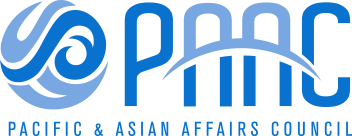“El Salvador experienced civil war for many years. Even now, there’s a lot of drug use and negative situations, particularly among youth, that our nation needs to address. But how? Surfing. Surfing is something that changes lives. Surfing is a gift,” an El Salvador surfer and business owner elaborated at a meeting with the State of Hawaiʻi’s Department of Business, Economic Development, and Tourism (DBEDT). One DBEDT host, also a lifelong surfer and business owner, smiled and said, “Because surfing heals you. In Hawaiʻi, it’s the same. We also have problems [related to drugs]. But when we get in the water? Every time is just like your first time going out.”
In December, PAAC hosted an International Visitor Leadership Program delegation comprised of nine El Salvador nationals handpicked by their government and their local U.S. Embassy to visit Santa Monica, Huntington Beach, and Oʻahu to learn about maintaining effective and responsible surf tourism. Eager to build its nation’s economy and provide its people with unprecedented opportunity, the El Salvador government tasked its Ministry of Tourism with advancing a “Surf City: El Salvador” strategy founded on principles of cultural, economic, and environmental sustainability.
While on Oʻahu, the group met with representatives from the surfing community, the Hawaiʻi Tourism Authority, DBEDT, the World Surf League, the Drowning & Aquatic Injury Prevention Advisory Committee, and The Resort Group. During these meetings, the delegation discussed everything from ocean safety policies, event marketing strategies, resort zones, and partnerships, to the double- edged nature of tourism and the consequences of imbalanced development.
The delegation discovered the primary challenge lies in prioritizing long-term wellbeing over short- term economic gain.
As one of their meeting hosts warned, “Be careful what you wish for with tourism. You need to decide what is best for your community. What do you want seven generations from now? Surf contests in El Salvador should not exclude El Salvadorans because the ocean is a public resource. 6.5 million people in El Salvador? Make them happy. Money will come and go. Leaders will come and go. The world will change, so remember your kuleana and who you are.”
